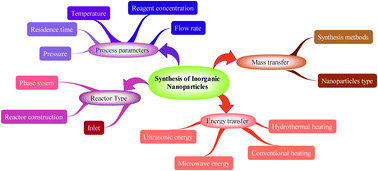Inorganic nanoparticle synthesis in flow reactors – applications and future directions
Abstract
The popularity of nanotechnology results from the possibility of obtaining materials that have better chemical, electrical, thermal, mechanical, or optical properties. Until recently, nanoparticles were produced in batch processes. Numerous methods of nanomaterial synthesis have been described in the literature; however, the production of nanomaterials on a larger scale is still limited. The advantages of using flow processes are the possibilities of increasing the operating efficiency of the installation, which would respond to the growing demand for nanomaterials, as well as maintaining high purity products with well-defined physical and chemical properties. This review presents the latest achievements in the flow synthesis of metal nanoparticles, metal oxides, semiconductors and complex inorganic structures. Depending on the energy source, the products differ in size, shape, dispersion and stability, which determine their future properties. The choice of type of reactor prevents clogging of the reactor and deposition of particles on the walls of the channel. The purpose of this work is to analyze the state of knowledge regarding the production of inorganic nanoparticles by flow methods. This work is a review of the types of reactors used to obtain nanoparticles and the benefits and limitations of their use in industry. The introduction of flow technologies for obtaining nanoparticles can play an important role in the development of ecological and sustainable processes for obtaining nanomaterials, and the methods presented are part of the Flow Chemistry trend. Finally, this Review covers future directions of flow nanoparticle synthesis with conclusions and outlook.



 Please wait while we load your content...
Please wait while we load your content...